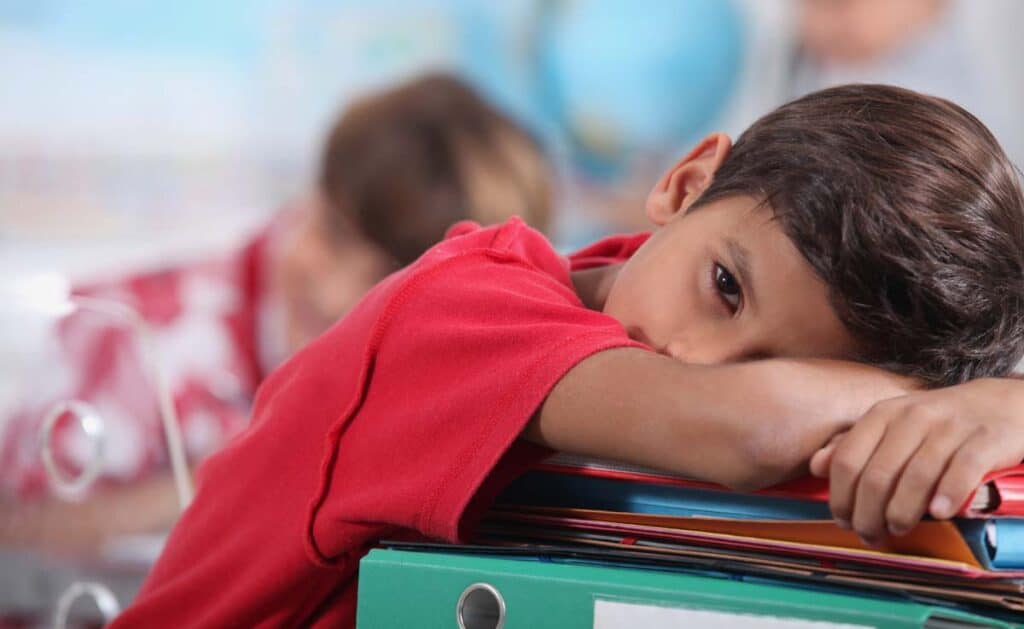As children spend seemingly more and more time in front of digital devices, many parents worry whether too much screen time could be having an impact on vision health.
In short – yes it does – and a leading issue is ‘blue light’ which is commonly emitted by electronic devices such as fluorescent lights, LED TVs, computer screens, smartphones and tablets.
Blue light is a short wavelength, high energy frequency of light. The sun is the most prominent source of blue light. Blue light is essential to good health and maintaining a healthy circadian rhythm (internal process that regulates the sleep–wake cycle).
Due to the energy within blue light, it is also associated with damage to the retina and may also be associated with digital eye strain, sometimes also known as computer vision.
The eye is very good at filtering UV radiation, but it can’t filter visible blue light. This light is free to pass through the cornea and lens and enter the retina at the back of the eye.
In short – yes it does – and a leading issue is ‘blue light’ which is commonly emitted by electronic devices such as fluorescent lights, LED TVs, computer screens, smartphones and tablets.
Blue light is a short wavelength, high energy frequency of light. The sun is the most prominent source of blue light. Blue light is essential to good health and maintaining a healthy circadian rhythm (internal process that regulates the sleep–wake cycle).
Due to the energy within blue light, it is also associated with damage to the retina and may also be associated with digital eye strain, sometimes also known as computer vision.
The eye is very good at filtering UV radiation, but it can’t filter visible blue light. This light is free to pass through the cornea and lens and enter the retina at the back of the eye.
Link with Age-Related Macular Degeneration
Studies have shown that blue light may cause damage to the light sensitive cells in the retina and that this damage resembles that caused by Age-Related Macular Degeneration (AMD). AMD is a leading cause of vision loss in Australia.
Research shows that children begin zooming in on digital devices, such as their parents’ tablets or smartphones, as young as 6 months old. By their teens, studies have found, kids spend nearly 7 hours a day using screened-based media, watching TV, playing video games, and using social media. Especially if they are having fun, children might keep playing and watching to the point of eye-rubbing exhaustion.
This doesn’t include additional time spent using screens at school and for homework.
This doesn’t include additional time spent using screens at school and for homework.
Some of the symptoms of possible vision problems:
- Fatigue and reduced concentration
- Eye strain and headaches
- Sensitivity to light
- Excessive tearing
- Frequent eye rubbing
- Red and sore eyes
- Nausea and motion sickness
- Consistently sitting too close to the TV or holding a book too close
- Closing one eye to read, watch TV or see better
- Unusual head turn or body posture when reading or writing
- Learning difficulties
- Poor reading comprehension and short attention span
- Avoiding activities which require near vision such as reading or homework, or distance vision such as participating in sports or other recreational activities
- Loss of place while reading, or using a finger to guide eyes when reading
- Co-ordination problems and clumsiness with ball skills
- Difficulty copying from the board
- Letters and numbers reversal when writing
Digital devices tend to keep children indoors, when exposure to natural daylight is critical to developing eyes.
Studies have found that children who spend more time indoors are more likely to develop short-sightedness (myopia). The exact cause isn’t yet known, but researchers believe that UV light (providing the eyes are protected from intense sunlight) plays an important role in healthy eye development. The rate of short-sightedness in children has increased dramatically in the past 30 years.
Studies have found that children who spend more time indoors are more likely to develop short-sightedness (myopia). The exact cause isn’t yet known, but researchers believe that UV light (providing the eyes are protected from intense sunlight) plays an important role in healthy eye development. The rate of short-sightedness in children has increased dramatically in the past 30 years.

So what should you do?
Refrain from using a tablet or phone within an hour of sleep may help maintain healthy circadian rhythms. Taking regular breaks from staring at a screen is an excellent way to minimise eye strain.
If you’re worried that your child is spending too much time in front of a screen and that their eyes or sleep patterns may be harmed by blue light, turn off their devices, buy them a book and book an eye test with an optometrist. Here at Kofsky Optometry we specialise in vision correction treatment for children.
You only get one pair of eyes, so taking care of them is important. Many eye disorders can be corrected if discovered and treated early.
If you’re worried that your child is spending too much time in front of a screen and that their eyes or sleep patterns may be harmed by blue light, turn off their devices, buy them a book and book an eye test with an optometrist. Here at Kofsky Optometry we specialise in vision correction treatment for children.
You only get one pair of eyes, so taking care of them is important. Many eye disorders can be corrected if discovered and treated early.



